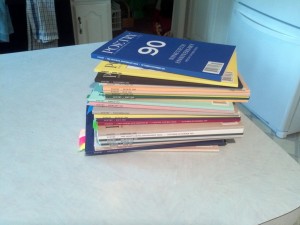April 1, 2013
Monday
he’d come to depend on his burden,
wasn’t sure who he was without it. . .
— Stephen Dunn, b. 1939
American poet
I’ve stolen the title — or nontitle — of this post from a fellow journaller, Jan, whose blog “Catchy Title Needed” is still up at Blogger, but has no content available. So I guess that makes her a former journaller.
I posted no new content in March. I’m rebooting again, taking up where I left off, trying to surface out of the mental murk that Lent and the end of winter became. “If you want to test your memory, try to recall what you were worrying about one year ago today,” advised a writing site I follow on March 17. Of course, I had to go to my basket of journals and pluck out J35 (I’m in J39 now) to see. No one should be surprised to learn that I was worrying about the same things, had the same concerns, the same goals, the same glaring failures and tiny successes noted.
I endured/observed Holy Week by attending three funerals, rising up yesterday morning to contemplate the Paschal mysteries with bobolink for chorister, and orchard for a dome. It was during that time of solitary contemplation that I devised a project for National Poetry Month that will apply to at least one of my Six Goals of a Quality Life, the one about decluttering.
 At left you see the stack of Poetry magazines that have rested on a shelf since the Great Poetry Roundup of 2007. That post shows them in their place among my poetry holdings. Those shelves have stayed relatively stable for more than five years not only because I have successfully practiced the “get current and stay current” model of organization, but also because I haven’t bought a lot of new poetry in recent times.
At left you see the stack of Poetry magazines that have rested on a shelf since the Great Poetry Roundup of 2007. That post shows them in their place among my poetry holdings. Those shelves have stayed relatively stable for more than five years not only because I have successfully practiced the “get current and stay current” model of organization, but also because I haven’t bought a lot of new poetry in recent times.
I bought Poetry regularly between February of 1995 (when I was still in the classroom) and October of 2002, when I gave up for good the idea that I would ever develop as a poet and turned exclusively to fiction writing. I have 26 issues. During the Great Poetry Roundup, I endeavored not only to shelve the books in alphabetical order, but also to replace the torn strips of paper or the handy items that I habitually used to mark places I wanted to return to with neat Post-It flags. Fourteen of the Poetry issues have those.
Thus, the project for this year’s National Poetry Month: Read one poem a day from these periodicals, first the flagged poems and then anything else, post a quotation to Facebook and Twitter for #todayspoem, and write some kind of post for Markings, even if it’s only the poem and a brief observation. And at the end of all, decide if I want to keep this stack of material as it is, or extract the content that interests me, or just discard the whole thing.
This morning, after I took the picture, I picked up the issue on top, October-November 2002, celebrating the 90th anniversary of the magazine. One flag was in it, and I couldn’t determine at first which poem it marked: the one on the left, Rita Dove’s “I Have Been a Stranger in a Strange Land,” about Eve, bored with “all the aimless Being There” of her perfect life in paradise, or the other one, Stephen Dunn’s “Sisyphus and the Sudden Lightness.”
Very likely it was the Rita Dove poem. It begins with an epigraph from Emily Dickinson, and imagines Eve owning her own transgression instead of blaming it on a snake, shows her reaching for the unknown, taking a risk, relishing the moment before everything changes.
But today it was Stephen Dunn who spoke most eloquently to me. “Sisyphus and the Sudden Lightness” is one of a cycle of poems about Sisyphus, the errant King of Corinth punished for his deceitfulness by having to roll a stone up a hill, only to have it plunge down again, forcing him to start all over again. In Dunn’s vision, Sisyphus is reimagined as a modern suburban striver, one is resigned to living with the futility of existence.
Longtime readers know that I periodically move through periods of clinical depression, usually endogenous in origin but sometimes exacerbated by situational factors. (That is, I tend toward depression, especially during the dark months, even though there is much to be joyful about in my life, but any week with three funerals will put a damper on things.) Twice in the last two months I have utterly quit all this scribble scribble, only to take up the pen again or open the file, note the last changes, and begin once more.
I accept my burdens, because I don’t know who I am without them.